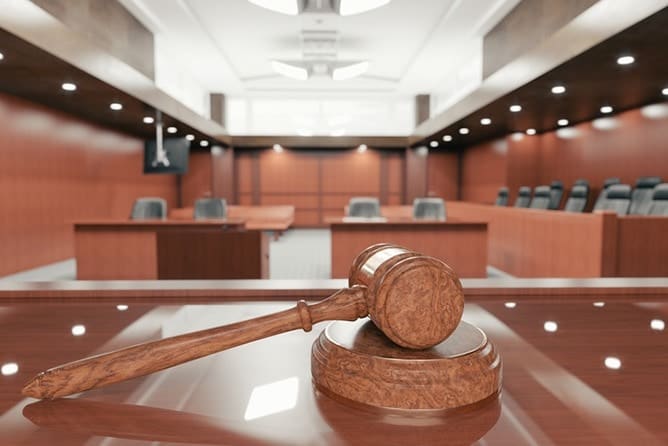When a personal injury accident occurs, law enforcement may respond to the scene. They’re looking to see if anyone committed a crime that resulted in the accident. They also want to find ways to improve road safety and prevent future accidents. After police investigate, they might make an arrest.
If the police make an arrest that results in a criminal charge, you may wonder how that might impact a corresponding injury case. In this situation, you will want to work with an experienced personal injury lawyer to understand the specific impact to your case. Here’s what you need to know about when a criminal case coincides with your injury case.
START YOUR FREE CONSULTATION
NO FEES UNLESS WE WIN!
What’s the Difference Between a Criminal Case and a Civil Case?
A criminal case is a violation of state criminal law. Examples of criminal cases that might arise in correlation with a personal injury case include assault and battery, drunk driving, leaving the scene of an accident, and reckless driving. The state brings the charges through a county district attorney or a smaller unit of government like a city attorney. In a criminal case, it’s up to the district attorney to decide whether to bring charges. The purpose of a criminal case is to punish the offender, order rehabilitation if appropriate, and protect society as a whole.

An injury case is a violation of state civil law. A violation of civil law may be based on laws that are written down, or it may be based on the common law. The goal of a civil case is to compensate the victim financially for their losses. It’s up to the victim to bring the charges and build the case.
The Burden of Proof in the Case Is Different
A burden of proof is the amount of proof that you have to have to win your case. For example, in a criminal case, the burden of proof is beyond a reasonable doubt. The state must prove that their theory of the case is true beyond a reasonable doubt.
In a civil personal injury case, the plaintiff must prove that the other side is responsible for their injuries by a preponderance of the evidence. That is, they have to prove that it’s more likely than not that the other side caused their injuries. A preponderance of the evidence is a much lower burden of proof than exists in a criminal matter.
The difference in the burden of proof means that it’s easier to win a civil case than a criminal case. Even if the defendant is found not guilty at a criminal trial, you may still win a civil case. Just like OJ Simpson won his criminal trial but lost the civil case, it’s possible to be found not guilty in the criminal case but civilly liable for a victim’s damages. Even if the state decides not to bring charges or if the criminal case doesn’t result in a conviction, there still may be a good chance for you to recover damages for your injury through a civil proceeding.
There Are More Damages Available in a Personal Injury Civil Case
If a criminal matter results in a conviction, the victim of the crime has the right to recover financial compensation for some types of financial losses. The payments the defendant must pay are called restitution. Restitution covers financial losses like medical bills, costs of psychological treatment, and compensation for the fair value of damaged property.
In a civil injury case, there are more damages available to a victim. In addition to all of the restitution possible in a criminal matter, in an injury case, the victim can ask for compensation for physical suffering, replacement household services, and more. It’s important not to assume that a criminal proceeding can result in the same financial compensation that a victim can receive by bringing a personal injury case.
Differences in the Statute of Limitations
The time that the state has to bring a criminal charge may be different than the time that you have to bring a civil case. You typically have two years to bring a personal injury claim. The state may have only one year to bring a charge of a simple misdemeanor.
Can I Bring a Civil Case If There’s a Criminal Case?
The state bringing a criminal case doesn’t stop a victim from starting an injury case. Instead, the civil and criminal proceedings can coexist. Typically, the criminal case resolves sooner than the injury case.

If the defendant makes statements in the criminal matter, you can use the comment to your advantage in the civil case. If the defendant in the case wishes to enter a guilty plea in the criminal case without admitting civil liability, the state may allow them to plead no contest instead of guilty. A no-contest plea has the same effect as a guilty plea in criminal court, but the defendant does not make an admission of guilt that carries over into the civil case.
A Criminal Violation Doesn’t Necessarily Mean Civil Liability
It’s possible that someone can be guilty of committing a crime without being civilly liable for the accident. For example, an accident occurs when a driver in a passenger vehicle stops at a stop sign. The truck driver behind the passenger vehicle doesn’t stop. The truck driver rear-ends the driver in the passenger vehicle. The police respond to the scene.
The police cite the truck driver for failing to stop for the vehicle in front of them. The driver of the passenger vehicle didn’t violate any traffic laws or act negligently. However, during the course of their investigation, the police notice a smell of alcohol relative to the driver of the passenger vehicle. They conduct field sobriety tests and administer a chemical test. The results show that the driver of the passenger vehicle is over the legal limit.
In this case, the driver of the passenger vehicle has only criminal liability for his offense. Although the driver may have acted negligently by driving over the legal limit for alcohol, his negligence didn’t cause the accident. Instead, the truck driver caused the accident by failing to stop when there was a vehicle in front of them at the stop sign. In this case, the truck driver has civil liability, and the driver of the passenger vehicle has criminal liability.
How Can a Personal Injury Attorney Help?
If you’re hurt in a personal injury accident, it’s important not to assume that a criminal matter can successfully resolve the case. An experienced injury attorney can help you evaluate your case to determine how a criminal matter might impact your personal injury claim.
Our Las Vegas and Henderson personal injury lawyers can help you look at your case in light of Nevada’s criminal and civil laws to help ensure that you recover fully and fairly for your losses.
Areas We Service in Las Vegas, Nevada
Las Vegas Strip | Henderson | Anthem | Summerlin | Paradise | Spring Valley | North Las Vegas | Summerlin North | Summerlin South | Sunrise Manor | Nellis AFB | Desert Shores | Downtown South | Charleston | Richfield | Crestwood | Angel Park Ranch | Queensridge | Casa Grande Pines | Winchester | West Las Vegas | Green Valley North | Lake Las Vegas | Sun City Summerlin | La Madre Foothills | Tule Springs | Mac Donald Highlands | Green Valley Ranch
Adam S. Kutner reviews and testimonials
“I needed an attorney because I couldn’t deal with the accident on my own, so I needed someone else’s opinion about my accident.
Well I heard about Adam Kutner through an associate of mine and I chose to seek him because I heard of him before also, so I thought he would be the best option for me.
I was very happy with my settlement and it came quicker than I thought, in just a couple months I received a check in the mail.
When I recommend Adam Kutner I would tell them that the settlement comes very quickly, and he is very helpful with transportation and whatever else you may need.”
– Deborah Banks. 5/5 Stars
START YOUR FREE CONSULTATION
NO FEES UNLESS WE WIN!
SE HABLA ESPAÑOL
Call Now! Free Consultation!

Adam S. Kutner
PERSONAL INJURY LAWYER
With more than 34 years of experience fighting for victims of personal injury in the Las Vegas Valley, attorney Adam S. Kutner knows his way around the Nevada court system and how to get clients their settlement promptly and trouble-free.












